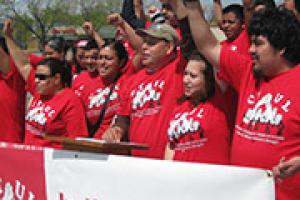Turning the Tables in Minnesota
The American Prospect
 This is a precedent setting agreement for the Twin City region, Minnesota and even the nation. Many of the workers affected by this new deal with Target represent a segment of the work force that has often been considered “unorganizable.” Language barriers and use of immigration status to threaten workers have all been contributing factors in explaining the difficulty in organizing vast segments of low-wage workers in the United States.
This is a precedent setting agreement for the Twin City region, Minnesota and even the nation. Many of the workers affected by this new deal with Target represent a segment of the work force that has often been considered “unorganizable.” Language barriers and use of immigration status to threaten workers have all been contributing factors in explaining the difficulty in organizing vast segments of low-wage workers in the United States.
Spread the word